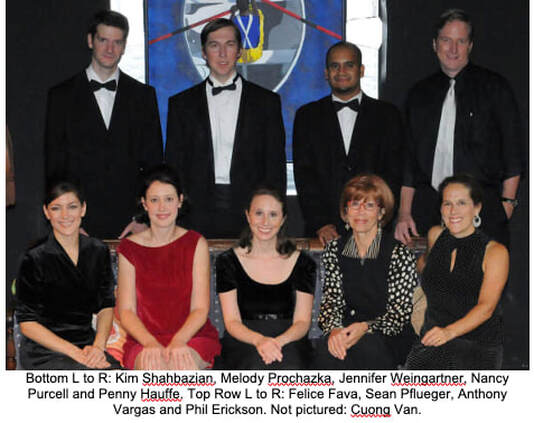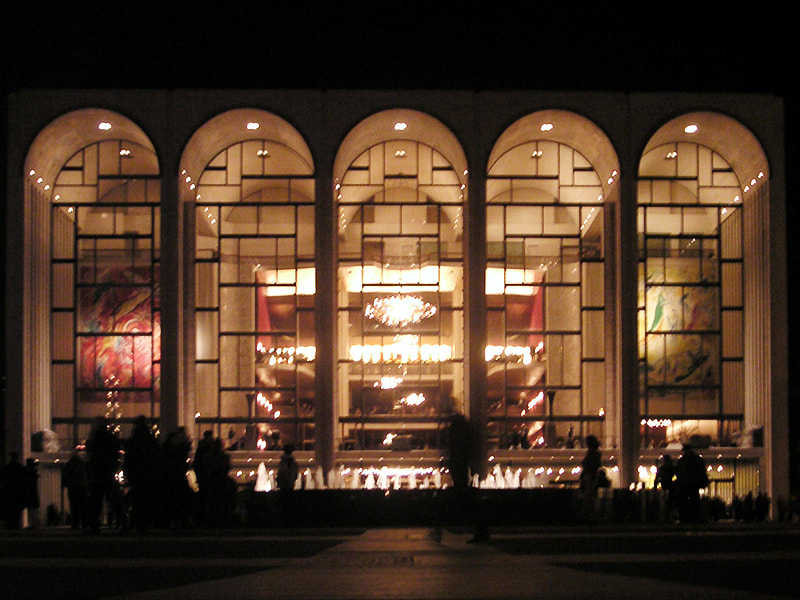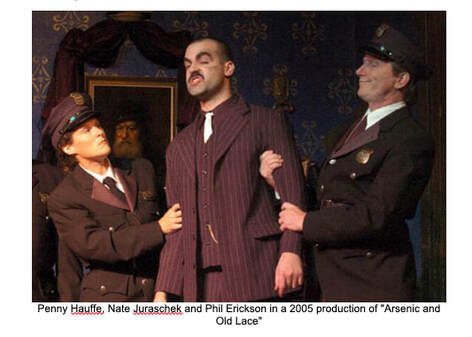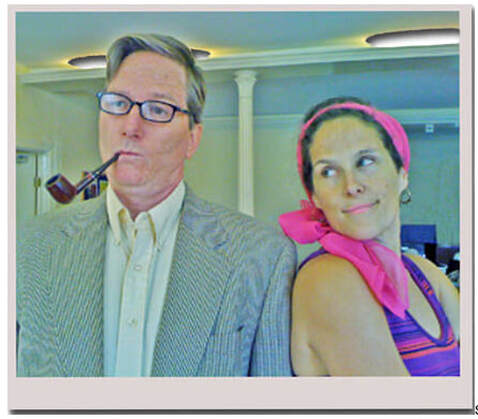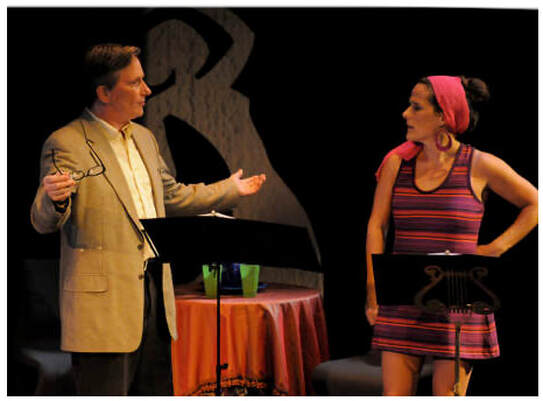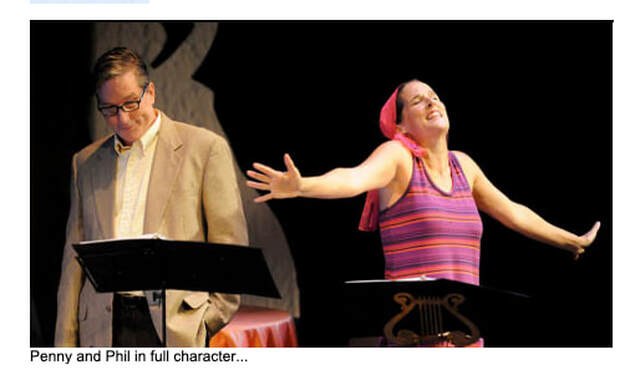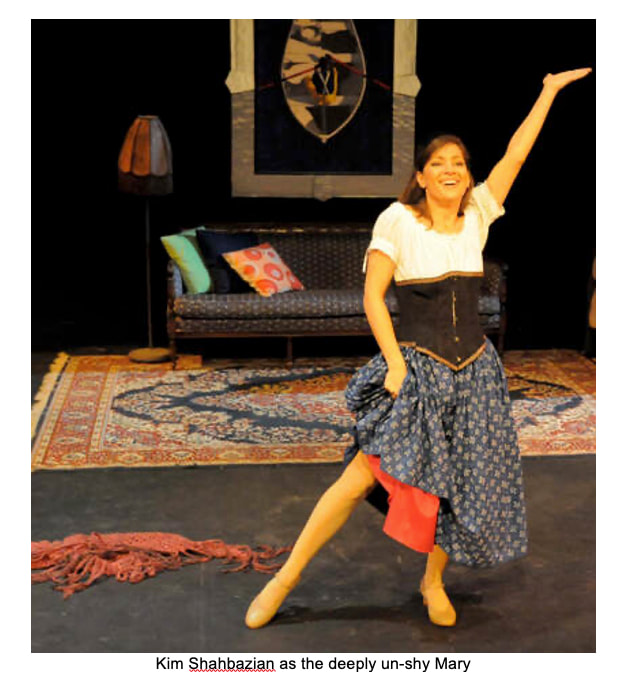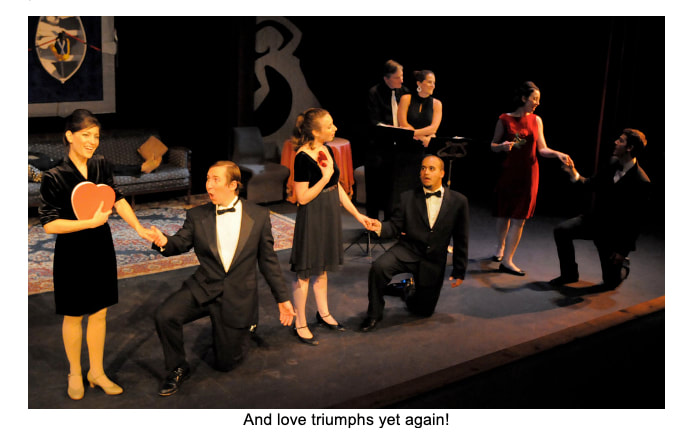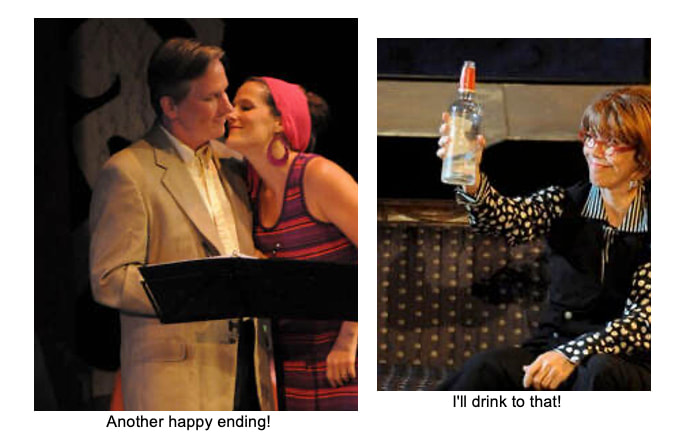|
DECEMBER 2009 Ever wondered what it would be like to put together a "Light Musical" in 7 short weeks. Had to be ready for Valentine's Weekend! Wondered what the trials, tribulations and triumphs of writing and directing that show might be? All right. Then how about a diary as we work with professional singers and some of the best actors in the DC area to create a comedy with gorgeous music. Great! Let's go... Romance from Broadway to Lincoln Center began when a man deeply involved in the arts here in Loudoun County, Virginia: Chris Maré. met with Loudoun Lyric Opera President Pamela Butler to throw out an idea: interest new audiences in Opera through a review of Broadway and Opera songs, and set the show in 1966, just as the Metropolitan Opera was being relocated from 39th and Broadway to its new digs Lincoln Center. Pam knew a good idea when she heard one, brought it back to the board and the tweaking began. The common theme became "Romance", and Pam suggested having the review hosted by Nelson Eddy and Jeanette MacDonald (two of my personal heroes). Pam asked if I would I like a commission to write the script and direct the show? As these are my two favorite occupations, I jumped at the chance. And, since then, creating Romance from Broadway to Lincoln Center has been like writing a sonnet — one long, painful, curious, but ultimately satisfying sonnet. Nelson and Jeannette soon evolved into a married couple with respective expertise in Opera and Broadway music. They'd be rehearsing a tribute presentation of romantic music, each presenting fascinating details of the songs from their respective genres. The catch: there's no money for the production, so their producer, Jackie, has wheedled the Jeanette and Nelson into letting everyone rehearse in their living room. My "Poetic" constraints: 1. Every song had to be in the public domain, because who can afford modern works? 1966 made that a cinch, and our Music Director, Cuong Van, Pam Butler and I worked together to choose each piece. 2. Audition the best singers in the area - the ones able to perform both Broadway and opera tunes (two completely different sets of vocal training) - during the busiest time of the performance season. 3. Oh, and make certain all of them can act, because they'll all have lines. 4. Write a brilliant show. Or a great show? Or a good show. But for heaven's sake, Meredith, don't write a bad show. This last I must leave to the critics to decide... but it keeps me up at night, just the same. Besides finding songs in the public domain, 1966 turned out to be a great choice for me for two reasons: I began life as an American historian, and it's easy for me to wanna' play in that sandbox. Secondly, I had two fabulous aunts who lived in New York City in '66. Some of my best childhood memories involve visits with my highly sophisticated Aunt Ruthie who worked for Life Magazine and lived in a posh city apartment. And even more memorable were my visits with my brilliant, enthusiastic and artsy Aunt Libba, who worked at a medical research center and happily dragged me to every favorite corner of "her city", so I could truly understand why New York City was the center of the Universe. So, let's talk romance. All great story telling begins with strong, recognizable conflict, so of course the stars, Nelson and Jeanette, must be at odds: he's opera; she's Broadway. He's the Managing Director of the renowned Brittleupsie-Yodelthor Opera Company, and she's the Head of Broadway Musical Research at the Glockenfluder Institute of Rhythm and Lyrical Song. He thinks Broadway is fluff; she thinks opera is a snob's game. But they've both been hired by the Paleos Perdomai (Latin translation, "Old Farts") Foundation to present a history and presentation of romantic opera and Broadway music. Jackie, the producer, has worked with Nelson and Jeanette before, and when these two begin to fray at the edges, she knows how to knit things up. WRITING and CASTING and CHANGES, OH, MY! This... has been an unusual play in so many ways, with casting no exception. Playwrights know that having a strong sense of character helps a play along, and I prefer Neil Simon's method: he writes a new play with a certain actor in mind. I've used this technique on and off for years, depending on the work, and, if I'm lucky, the actor I have in mind is actually available for the show. I especially like to "pre-cast" in my head when I have a short amount of time to write, and my writing time for Romance was tight. When Pam Butler suggested the Nelson Eddy / Jeanette MacDonald concept - a married, musical couple looking back on their work ala Maytime - I immediately thought of Penny Hauffe and Phil Erickson, two actors with whom I've had the pleasure to work for many years in many different types of shows. Once I had those leads in my mind, I was ready to write. As I let my mind burble, the framework for the show became a rehearsal... in the home of the couple. Oh! Suddenly, I needed a producer. No sooner had I begun to write the role of a Producer than it became Nancy Purcell's role - another fabulous local actor. Now it was time to break into a cold sweat and call Penny, Phil and Nancy, hoping beyond hope they could all do it... Yes, they were available and willing! Huzzah! I asked the three to come over and read the first 10 pages with me. I'm never so precious with my words that I can't appreciate one simple fact: an actor who invests hours trying to understand their character is likely to see something in a role that I couldn't while my subconscious was pouring out a play. And, for the rehearsals of a play's premiere performance, the playwright is usually right there in the rehearsal studio, because a playwright who puts a lid on the actors' process while trying to get a new work on its feet is a fool. Same rule applies for a director who tries to bring actors "to heel" to a precise artistic vision for any play. A great production is always a group effort, a group investment, and, if done correctly, a group pleasure beyond words. So I listened to Penny, Phil and Nancy's input, and, as I continued writing, six singers began to come to life, and their songs and stories began to naturally intertwine with the warring couple and their embattled producer. In addition to the singers, Since the "rehearsal" takes place in the couple's living room, it was natural to have a large piano there... and that meant the pianist had to become part of the show... and take some of the lines. Well, Loudoun Lyric Opera's exceptional Music Director, Cuong Van, is a world-renowned pianist with undergraduate degrees from Saigon Conservatory and Moscow State University, and a Masters in Orchestral Conducting from Cleveland Institute of Music. Former concert engagements include Lincoln Center, Carnegie Hall and the Smithsonian Institution, and in December, Cuong had been in Vietnam conducting the Ho Chi Minh City Orchestra. But... something told me he'd be up for this. I braved the phone call, ET VOILA! Yes, Cuong was happy to play the part. This was just getting better and better. Next up: in order to secure the six singers needed for the show, Pam Butler sent an audition notice to her Loudoun Lyric Opera list. With the help of accompanist Nancy Prestipino, Pam and I spent two wonderful evenings meeting and listening to some of the most amazing singing talent in the area. Opera singers tend to perform with local companies like Loudoun Lyric Opera alongside professional organizations such as Washington or National Opera, so the vast majority of those auditioning were professional singers in every sense of the word. And the group I wanted to cast held both Broadway Musical and Opera experience - and were terrific actors, as well. I felt like a kid in a candy store. Casting came together (with only a couple bumps in the road: always hard to find enough male tenors!), and now I really can't wait to get started. This odd little hybrid holds great promise! 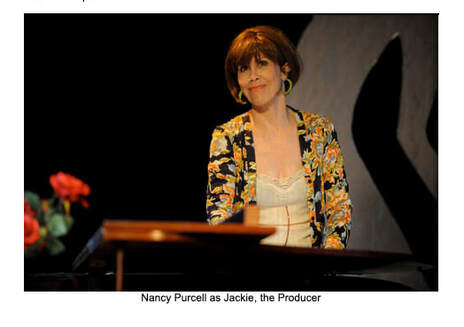 January 6, 2010 THE READ THROUGH Monday night the cast and crew of "Romance from Broadway to Lincoln Center" met in a meeting room at Leesburg United Methodist Church, circled the long benches, and read through the script together for the first time. As a writer and a director, the first read -through is an adventure riddled with adrenalin rushes and moments of shear terror. As a director, you love it when the actors start to get a feel for the show and really start to enjoy themselves. And the cast was fabulous, so stacked up to a hundred read-throughs before this one, it was a pure delight. But you're also taking notes as you go, and your heart stops a little when you realize something isnt working. Then you spend a sleepless night thinking about how it went, mulling things over, and by morning, you know what you have to do and how to help the actor do it. But for the playwright the reading was another kettle of fish. The gist of the show is to have the couple begin arguing and have the Producer bring them back together in the end, with the singers and pianist trapped in the middle several times. For the audience to go along for that ride, they have to like the couple before things get out of hand. If the two begin the fight too early (and they were), the audience would spend the whole night hoping they'd shut up and get a divorce already. Just needed to tweak things... It was easy for me to make Jeannette more gentle, but what could I do for Nelson? He needed to love his wife, but he also had to be a true opera snob. What do I do to make the audience like him, without changing focus? Well, Frank Capra once said, If you can't make a character good, make 'em clever. That was my next task. Make Nelson more clever. And one more thing that needed tweaking was the tension build - the kind that keeps audiences on the edge of their seat. My ride had some bumps to smooth out. One joy of the reading was to hear the vocalists act. The show is such an anomaly - a combo pack of Broadway and opera song - that I was once worried we wouldn't find singers who could go between the genres. And if they could sing, could they act? I shouldn't have worried. These vocalists have a broad range of experience in both opera and musicals, and most have had acting experience. In fact one, Melody Prochazka, first trained at NYU had studied at the Stella Adler Studio. Melody plays Susie, a flamboyant singer who flirts with Nelson every chance she gets. Pitch perfect at the read-through, I can't wait to see what she brings to it as we layer the work in rehearsals. Ah, the layers. There was a time when I was learning the basics of Director basics and I wanted everything happening at once: I'd tell the actors EVERYTHING I wanted for their character in every moment... and be surprised when they gave me a performance equivalent to a dead stare. Thank heaven I learned. The fellow who taught me how to slowly build a show was Tom Sweitzer (Now head of the acclaimed "A Place to Be" Music Therapy Academy in Middleburg, Virginia). As Tom worked through our play, PORCHES, I'd say, "But Tom, you haven't asked her to go further with that!" And he'd say, "She's not ready, Meredith. When she's ready, I'll ask her to go full out." And he would, and she did, and I learned. One thing a director also has to learn is that you 're lucky if the actors remember and apply 10% of what you're asking for. So only ask for the most important things... and then let them own it and take it from there. As I've mentioned before, one thing I really love about the rehearsal process is watching actors bring amazing things to a script... if you let them. So I start the first rehearsal with blocking (movement) and talk about some of the things I think are important to the show. And we build a show together from there. Our first true rehearsal (last night) was only with the principal actors: Penny Hauffe (as Jeanette McAvoy), Phil Erickson (Nelson Eddington), and Nancy Purcell (Jackie, the Producer). We first talked about the characters (and the new changes I 'd made to the script). These three actors are excellent and, in a musical, they tend to want to build from the physical out. So we started discussing their look, their demeanor, costuming - the elements that will cue them to head in the direction they want to go. For the producer, it'll be a sophisticated - slightly artsy style. Pantsuit for a "power woman" of 1966. For Nelson, it's a tweedy sophistication - the glasses are crucial to give him the scholar's gravitas. For Jeanette, it's embracing the "Beat Generation" culture - where hippies were soon to come from, so she hangs out a lot at the famous Caffé Cino - a great source of 1960s New York City beatnik culture, and one of the first off-off Broadway venues to explore new plays, poetry and other art forms. This is in huge contrast, of course, to Nelson's interest in opera - a conservative cultural phenomena - and there's the natural conflict between the two. From there, we walked through the First Act with basic blocking and established what I consider the important things: the couple has to clearly love each other and the Producer has to clearly become alarmed as their relationship begins to disintegrate. From now on, I'll shut my mouth a bit, sit back and see what the actors bring... January 2010 FOUR WEEKS OUT! As a playwright, I'm very aware that the words of a play are living things — things that are going to be read aloud, interpreted and chucked back at you by those rare, brave beings the world calls actors, so you better be ready for it. What I love about writing plays is that you find out whether it's working right away. If the actors don't get it, you first have to ask yourself whether they should get it. And if they should, how are you going to make that aspect of the plot, or the joke, or the character clearer to them... so it'll be clear to the audience? Hey, sometimes you want things to be subtle. When I wrote the book for Tom Sweitzer's musical, PORCHES, we wanted the audience to wonder about the paperboy and the woman with him… and let each audience member discover for themselves that the two were not, in fact, of this earth. But a romantic comedy rarely needs to be subtle. As I've already mentioned, in every play the audience has to either love (Jeanette), admire (Nelson), or empathize (Jackie) with characters. Now they or their situation always needs to be funny. Personally, I like to build a joke in layers (which is to say, building a character with layers, such when that person does the same ridiculous thing again, your audience becomes absolutely giddy with recognition). But then there's the Comedy Rule of Three: you can ruin any good thing if you revisit it more than thrice. This is as firm a law of physics as the Law of Entropy. Next, for the audience to have a chance to laugh, they have to believe the conflict. Very important rule: share a private joke with the audience — something they can see but the characters can't. Last rule: my old play writing instructor says there are no rules in comedy, so these are just my rules. I have Actors' Rules, too. Each actor has to love their characters. Doesn't matter if they're evil or good, brilliant or dense, if they don't love who they are, the audience will sense it. It's all downhill from there. It's just physics. As a director, one of my jobs is to help an actor invest in that character - make it their own. But as a playwright directing their own show, I can't get too nuts about whether the words are memorized perfectly. Infinitely more important to me that they understand the character and let ideas flow from there. For example, at our last rehearsal, Kim Shahbazian brought up a great point: she plays Mary, and I wrote Mary as a vocalist who goes from shy to brazen during the play. As Kim worked on Mary, she pointed out that, if this girl was a successful vocalist, she couldn't really be shy, could she? She thought maybe neurotic would be a better starting point. Well, folks, that is even funnier, of course, and it'll be even funnier to you when you see the show. This is exactly the sort of thing I love about rehearsals. In fact, at that last rehearsal, every actor brought something new to their character. And when that starts happening (and I know it will keep right on happening), the rehearsal process becomes this amazing journey of discovery. As the actors throw out ideas, my creative juices begin pumping - which lead to new ideas - ways to play on a running theme - pull in a running joke - or bring together a stray piece from another part of the play. We work as a team to make the play richer, deeper, more layered. That whole wonderful process then translates into a living, vibrant performance that will abide in audiences' memories for a very long while. Is it any wonder I love actors? Any wonder I find directing a most noble and rewarding pursuit? February 6 THE LAWS OF NATURE Art loves to make room for nature, but this is ridiculous. Loudoun County, Virginia is buried under 3 feet of snow (still falling as of Saturday, Feb. 6 at 11:30 am), and our week of Technical Rehearsals (Tech Week) for Romance begins Monday. Sigh. First the good news: the show was pretty much ready a week ago, so I'm not losing sleep... yet. In fact, the cast and I were hoping to strike a balance and not wind up over-rehearsing. Well... no worries about that now! Monday at 4 pm is the time we're supposed to load in the set to Franklin Park Performing Arts Center in Purcellville. Yes. That should be hilarious. Thankfully, this set is meant to be black box - just furniture with some standing pieces to give the set height. A truck is what we need to transport furniture, and a truck is going to be the only thing that can get around town on Monday, so that's all good! Tuesday night is full dress rehearsal (the only night everyone can be there), and we were expecting about 100 high school drama students from Stone Bridge H.S. for audience, but... there ain't gonna' be any school on Tuesday. Oh, and they're predicting a little more snow that day, too. So, that'll be even more fun. But, since "hoping" worked out so well for us last time, here's one more hope: I hope everyone has cabin fever by next weekend and they all dig out of their igloos to come see Romance at Franklin Park. We'll be there if we have to get there by toboggan! ROMANCE FROM BROADWAY TO LINCOLN CENTER was produced to critical acclaim at both Franklin Park Arts Center in Purcellville, Virginia and Lansdowne Resort in Leesburg, Virginia. Romance was sponsored by The Friends of Franklin Park Arts Center and produced by the Loudoun Lyric Opera Company.
The performances were dedicated to the memory of Christopher Maré, who, we are sad to say, passed away before rehearsals began. Meredith Bean McMath ### A note from 2010 Loudoun Lyric Opera President read at Christopher Maré's memorial service concerning the beginnings of Romance from Broadway to Lincoln Center On rare occasions, a chance meeting or brief acquaintance can have a lifelong effect. That was my experience with Christopher Maré. I met Chris only once, on April 24th of this year [2009]. We shared lunch at Magnolia’s while discussing Loudoun Lyric Opera’s exciting plans to move into our first theater home at Franklin Park Arts Center this fall. Chris’ knowledge of opera was extensive and he shared my great love for the art (What other venue allows one to sing, dance, act and communicate in a foreign language all at once?) Chris & I also shared several common acquaintances in the performing arts world, from here in Loudoun County up the East Coast to New York City and the South shores of Lake Ontario. I felt immediately connected to Chris through our common interests, his wealth of knowledge and delightful persona. During lunch Chris shared his idea for a musical revue to be presented by LLO at Franklin Park. He suggested using the title, “From Broadway to Lincoln Center” and that LLO perform songs from both musical theater and opera, as a means of acquainting new audiences to our art form. LLO ran with his idea, and our show will take place Valentine’s weekend 2010 in his memory. Our Pie Jesu from Andrew Lloyd Webber’s Requiem offered at today’s service, celebrates Chris’ life and shares his love of the combined styles of Broadway and classical compositions. As Loudoun Lyric Opera enters its third season, I trust that Chris will somehow be watching over us. Our choice of the songs You’ll Never Walk Alone from Rodgers & Hammerstein’s Carousel and The Prayer (“I pray you’ll be our eyes and watch us where we go…”) show our faith that he will continue with us on our musical journey.
0 Comments
Leave a Reply. |
